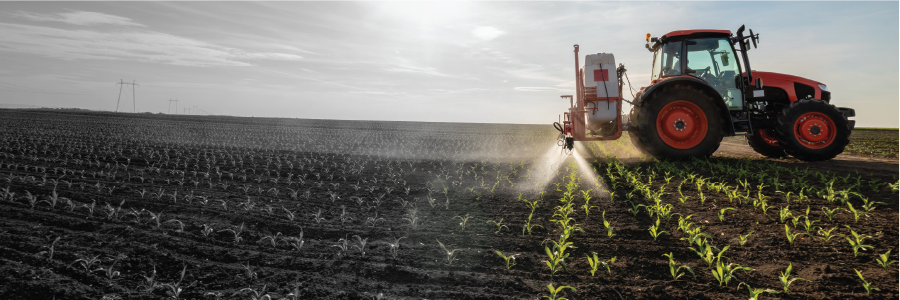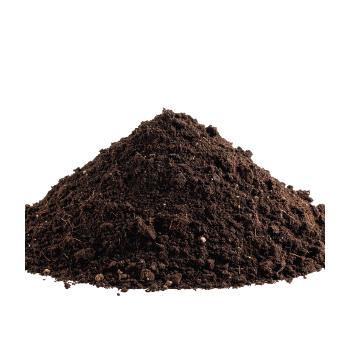The “regenerative” benefits often claimed by conventional no-till proponents include reduced erosion, a lower carbon footprint, increased soil carbon sequestration, and greater farm profits through reduced labor costs.6 What’s left out is that this conventional “no-till” farming as a standalone practice, rather than one part of a truly regenerative system, relies heavily on synthetic pesticides and fertilizers.7 8 In fact, the top two no-till conventional crops, corn and soy, account for 33 percent of all pesticide use annually in the U.S., according to a recent report from Friends of the Earth.9 10 11
Friends of the Earth examined current scientific research and USDA data to reveal the environmental and human health costs of conventional no-till corn and soy production.12 The key findings expose a reality far removed from truly regenerative outcomes.
- 93% of no- and minimum-till corn and soy acreage is treated with toxic synthetic pesticides.13 14 15 Studies cited in the report conclude that pesticide use is “incompatible with healthy soil ecosystems,” and others suggest it may cause more harm to vital soil organisms than routine tillage.
- Conventional no-till systems use 26 million more pounds of herbicides annually than their tilled counterparts, and that’s a conservative estimate.17 18
- 61% of the pesticides used on no-till corn and soy cropland are classified as “highly hazardous” to human health or the environment and are linked to cancers, birth defects, infertility, and more.19 20 21
- Producing the synthetic pesticides and fertilizers used on no-till corn and soy is associated with CO₂ emissions equivalent to as many as 11.4 million cars on the road per year—roughly the number of vehicles in the top nine no-till states.22
The report also challenges two flawed assumptions behind “regenerative” claims made about conventional no-till.23 The first is that reducing or eliminating tillage definitively improves soil health and boosts soil carbon sequestration.24 Yet this theory is based on measuring carbon in shallow soil layers where no-till systems concentrate it, rather than deeper layers where carbon is stored more stably over time, likely inflating its estimated benefits.25 The available data "show no clear relationship between no-till and carbon sequestration."26 Meanwhile, intensive pesticide use devastates the soil organisms responsible for 80 to 90 percent of healthy soil functions, including carbon sequestration.27
The second misconception is that tillage always degrades soil health.28 However, Rodale Institute's Farming Systems Trial (FST)—the longest-running side-by-side comparison of organic and conventional crop production in North America—concludes otherwise.29 In 2008, Rodale added continuous no-till conventional and intermittent-no-till organic plots to the FST.30 Sixteen years later, results indicate the most significant differences in soil health aren't linked to tillage or its absence. Instead, they depend on whether the system is organic or conventional.31 Soil organic carbon—a key marker of soil health and carbon sequestration—was 18 to 92 percent higher in the organic plots.32 33 Organic also matched conventional yields, cost 12 percent less overall than conventional no-till, and the soil had greater water aggregate stability, the soil’s ability to absorb water without breaking down.34 Long-term USDA trials also indicate that organic farming, tillage or not, supports superior carbon sequestration. Organic farms stored 400 to 600 more pounds of carbon on average per acre than conventional, including no-till conventional.35
So… if you and I aren't farmers, policymakers, or CEOs of agrochemical companies, why should the deceptive promotion of conventional no-till farming as sustainable and regenerative matter to us? Because we're eaters. We vote with our food budgets—and when we buy into a false solution, we help keep the real problem in place.
References
- Friends of the Earth. (2025). Rethinking No-Till:: The toxic impact of conventional no-till agriculture on soil, biodiversity, and human health. In https://foe.org/resources/rethinking-no-till/. https://foe.org/wp- content/uploads/2025/04/Report_No-Till_Report.pdf
- Longenecker, S. (2025, May 6). New report identifies “Toxic” impact of No-Till agriculture, inaccurately referred to as “Regenerative.” Rodale Institute. https://rodaleinstitute.org/blog/new-report-identifies-toxic-impact-of-…
- Friends of the Earth. (2025). Rethinking No-Till:: The toxic impact of conventional no-till agriculture on soil, biodiversity, and human health. In https://foe.org/resources/rethinking-no-till/. https://foe.org/wp-content/uploads/2025/04/Report_No-Till_Report.pdf
- Friends of the Earth. (2025). Rethinking No-Till:: The toxic impact of conventional no-till agriculture on soil, biodiversity, and human health. In https://foe.org/resources/rethinking-no-till/. https://foe.org/wp-content/uploads/2025/04/Report_No-Till_Report.pdf
- Friends of the Earth. (2025). Rethinking No-Till:: The toxic impact of conventional no-till agriculture on soil, biodiversity, and human health. In https://foe.org/resources/rethinking-no-till/. https://foe.org/wp-content/uploads/2025/04/Report_No-Till_Report.pdf
- Longenecker, S. (2025, May 6). New report identifies “Toxic” impact of No-Till agriculture, inaccurately referred to as “Regenerative.” Rodale Institute. https://rodaleinstitute.org/blog/new-report-identifies-toxic-impact-of-…
- Longenecker, S. (2025, May 6). New report identifies “Toxic” impact of No-Till agriculture, inaccurately referred to as “Regenerative.” Rodale Institute. https://rodaleinstitute.org/blog/new-report-identifies-toxic-impact-of-…
- Friends of the Earth. (2025). Rethinking No-Till:: The toxic impact of conventional no-till agriculture on soil, biodiversity, and human health. In https://foe.org/resources/rethinking-no-till/. https://foe.org/wp-content/uploads/2025/04/Report_No-Till_Report.pdf
- Longenecker, S. (2025, May 6). New report identifies “Toxic” impact of No-Till agriculture, inaccurately referred to as “Regenerative.” Rodale Institute. https://rodaleinstitute.org/blog/new-report-identifies-toxic-impact-of-…
- Pulse, S. (2025, May 21). Industrial No-Till agriculture increases pesticide use and harms soil – new report. Sustainable Pulse. https://sustainablepulse.com/2025/05/22/industrial-no-till-agriculture-…
- Friends of the Earth. (2025). Rethinking No-Till:: The toxic impact of conventional no-till agriculture on soil, biodiversity, and human health. In https://foe.org/resources/rethinking-no-till/. https://foe.org/wp-content/uploads/2025/04/Report_No-Till_Report.pdf
- Friends of the Earth. (2025). Rethinking No-Till:: The toxic impact of conventional no-till agriculture on soil, biodiversity, and human health. In https://foe.org/resources/rethinking-no-till/. https://foe.org/wp-content/uploads/2025/04/Report_No-Till_Report.pdf
- Friends of the Earth. (2025). Rethinking No-Till:: The toxic impact of conventional no-till agriculture on soil, biodiversity, and human health. In https://foe.org/resources/rethinking-no-till/. https://foe.org/wp-content/uploads/2025/04/Report_No-Till_Report.pdf
- Longenecker, S. (2025, May 6). New report identifies “Toxic” impact of No-Till agriculture, inaccurately referred to as “Regenerative.” Rodale Institute. https://rodaleinstitute.org/blog/new-report-identifies-toxic-impact-of-…
- Pulse, S. (2025, May 21). Industrial No-Till agriculture increases pesticide use and harms soil – new report. Sustainable Pulse. https://sustainablepulse.com/2025/05/22/industrial-no-till-agriculture-…
- Friends of the Earth. (2025). Rethinking No-Till:: The toxic impact of conventional no-till agriculture on soil, biodiversity, and human health. In https://foe.org/resources/rethinking-no-till/. https://foe.org/wp-content/uploads/2025/04/Report_No-Till_Report.pdf
- Friends of the Earth. (2025). Rethinking No-Till:: The toxic impact of conventional no-till agriculture on soil, biodiversity, and human health. In https://foe.org/resources/rethinking-no-till/. https://foe.org/wp-content/uploads/2025/04/Report_No-Till_Report.pdf
- Pulse, S. (2025, May 21). Industrial No-Till agriculture increases pesticide use and harms soil – new report. Sustainable Pulse. https://sustainablepulse.com/2025/05/22/industrial-no-till-agriculture-…
- Friends of the Earth. (2025). Rethinking No-Till:: The toxic impact of conventional no-till agriculture on soil, biodiversity, and human health. In https://foe.org/resources/rethinking-no-till/. https://foe.org/wp-content/uploads/2025/04/Report_No-Till_Report.pdf
- Longenecker, S. (2025, May 6). New report identifies “Toxic” impact of No-Till agriculture, inaccurately referred to as “Regenerative.” Rodale Institute. https://rodaleinstitute.org/blog/new-report-identifies-toxic-impact-of-…
- Pulse, S. (2025, May 21). Industrial No-Till agriculture increases pesticide use and harms soil – new report. Sustainable Pulse. https://sustainablepulse.com/2025/05/22/industrial-no-till-agriculture-…
- Friends of the Earth. (2025). Rethinking No-Till:: The toxic impact of conventional no-till agriculture on soil, biodiversity, and human health. In https://foe.org/resources/rethinking-no-till/. https://foe.org/wp-content/uploads/2025/04/Report_No-Till_Report.pdf
- Friends of the Earth. (2025). Rethinking No-Till:: The toxic impact of conventional no-till agriculture on soil, biodiversity, and human health. In https://foe.org/resources/rethinking-no-till/. https://foe.org/wp-content/uploads/2025/04/Report_No-Till_Report.pdf
- Friends of the Earth. (2025). Rethinking No-Till:: The toxic impact of conventional no-till agriculture on soil, biodiversity, and human health. In https://foe.org/resources/rethinking-no-till/. https://foe.org/wp-content/uploads/2025/04/Report_No-Till_Report.pdf
- Friends of the Earth. (2025). Rethinking No-Till:: The toxic impact of conventional no-till agriculture on soil, biodiversity, and human health. In https://foe.org/resources/rethinking-no-till/. https://foe.org/wp-content/uploads/2025/04/Report_No-Till_Report.pdf
- Friends of the Earth. (2025). Rethinking No-Till:: The toxic impact of conventional no-till agriculture on soil, biodiversity, and human health. In https://foe.org/resources/rethinking-no-till/. https://foe.org/wp-content/uploads/2025/04/Report_No-Till_Report.pdf
- Friends of the Earth. (2025). Rethinking No-Till:: The toxic impact of conventional no-till agriculture on soil, biodiversity, and human health. In https://foe.org/resources/rethinking-no-till/. https://foe.org/wp-content/uploads/2025/04/Report_No-Till_Report.pdf
- Friends of the Earth. (2025). Rethinking No-Till:: The toxic impact of conventional no-till agriculture on soil, biodiversity, and human health. In https://foe.org/resources/rethinking-no-till/. https://foe.org/wp-content/uploads/2025/04/Report_No-Till_Report.pdf
- Longenecker, S. (2025, May 6). New report identifies “Toxic” impact of No-Till agriculture, inaccurately referred to as “Regenerative.” Rodale Institute. https://rodaleinstitute.org/blog/new-report-identifies-toxic-impact-of-…
- Longenecker, S. (2025, May 6). New report identifies “Toxic” impact of No-Till agriculture, inaccurately referred to as “Regenerative.” Rodale Institute. https://rodaleinstitute.org/blog/new-report-identifies-toxic-impact-of-…
- Longenecker, S. (2025, May 6). New report identifies “Toxic” impact of No-Till agriculture, inaccurately referred to as “Regenerative.” Rodale Institute. https://rodaleinstitute.org/blog/new-report-identifies-toxic-impact-of-…
- Longenecker, S. (2025, May 6). New report identifies “Toxic” impact of No-Till agriculture, inaccurately referred to as “Regenerative.” Rodale Institute. https://rodaleinstitute.org/blog/new-report-identifies-toxic-impact-of-…
- Soil Carbon: What it is and Why it is important | AgNext | Colorado State University. (2021, October 26). https://agnext.colostate.edu/2021/10/26/soil-carbon-what-it-is-and-why-…
- Longenecker, S. (2025, May 6). New report identifies “Toxic” impact of No-Till agriculture, inaccurately referred to as “Regenerative.” Rodale Institute. https://rodaleinstitute.org/blog/new-report-identifies-toxic-impact-of-…
- Friends of the Earth. (2025). Rethinking No-Till:: The toxic impact of conventional no-till agriculture on soil, biodiversity, and human health. In https://foe.org/resources/rethinking-no-till/. https://foe.org/wp-content/uploads/2025/04/Report_No-Till_Report.pdf








